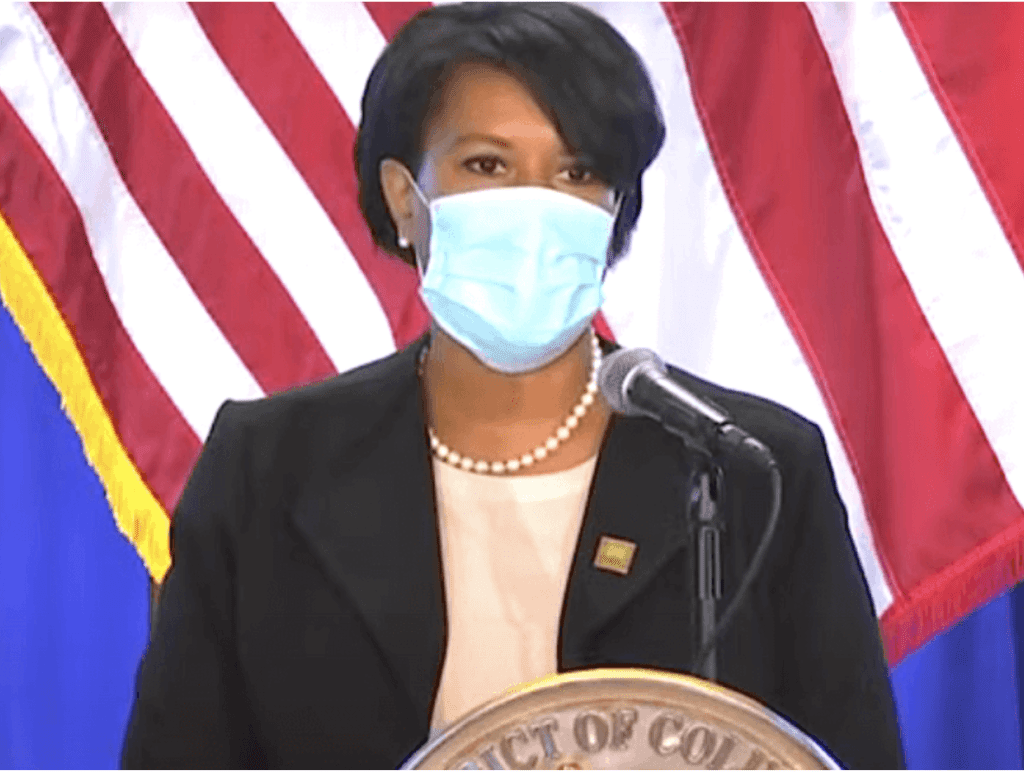Mayor Bowser Extends D.C.’s Public Health Emergency, Indoor Mask Mandate
By • January 27, 2022 0 939

Though Covid-19 case rates are dropping in the District, city hospitals remain stressed due to the Omicron variant’s rapid spread through the nation’s capital in recent weeks.
In response, Mayor Bowser yesterday ordered extensions of the city’s public health emergency – which eases liability and regulatory burdens on city hospitals – through at least Feb. 15. The city’s indoor mask mandate which was set to expire Jan. 31 has also been extended through at least Feb. 28. On Jan. 15, the mayor also launched “VaxDC” ordering all D.C. public businesses to require patrons ages 12 and older to display proof of vaccination upon entry.
“Given the number of visits to emergency rooms, continuing deaths from Covid-19, and staffing shortages at medical facilities due in part to staff being out with Covid-19, the District must continue the public health emergency for a limited period of time to appropriately protect public health,” the Mayor’s order of Jan. 26 stated. “By extending the limited public health emergency, the District and our healthcare partners can continue to respond expeditiously and safely to Covid-19 and its ongoing and changing impacts.”
Bowser explained that Covid-19 deaths and hospital visits tend to continue weeks after case rates begin dropping. “Although the surge of infections relating to the Omicron variant appears to be abating, the stress on hospitals and medical providers and facilities continues,” the Mayor’s order stated. “Hospitalization and deaths lag infections, so the District is facing increases in hospitalized patients with Covid-19, increased ventilator use by persons with Covid-19, and more deaths than the District experienced at the beginning of January. Even infections that do not result in hospitalization result in sickness, medical personnel in isolation or quarantine, and labor shortages. Persons suffering from Covid-19, persons who are afraid they have Covid-19, and persons simply seeking tests for Covid-19 continue to come to emergency rooms. These visits pose challenges for the delivery of timely services to all who are facing medical emergencies.”
The D.C. Hospital Association said in a letter that the “strain on the District’s health care system is greater now than at any time since the pandemic began,” according to NBC News. In a previous order, Bowser said some of the city’s hospitals experienced Covid-19 related staffing shortages as high as 25 percent. The Mayor’s public health emergency order allows hospitals to implement “crisis standards of care” which allow hospitals to lower the ratio of staff to patients, continue using out-of-state medical licenses and authorizes protections against legal liabilities.
Bowser cited national and local health statistics to place her extension of the city’s public health emergency in the context of the global pandemic. “More than 22 months after the World Health Organization declared a pandemic and the Secretary of the U.S. Department of Health and Human Services and the Mayor of the District of Columbia declared a public health emergency for the 2019 novel coronavirus, more than 72.28 million Americans have been diagnosed with Covid-19 and more than 866,000 have died from the disease. Locally, transmission stands at a seven-day average of 186.9 new daily cases per 100,000 persons; total confirmed infections in the District have risen to 128,739; and tragically, 1,278 District residents have lost their lives due to Covid-19.”
For Jan. 25, 2022, the District reported the following Covid-19 data: 2,872,878 “total overall number of tests;” 745,615 “total number of D.C. residents tested;” 129,108 “total positives;” 1,280 “total lives lost;” 34,985 “cleared from isolation.” (coronavirus.dc.gov)
Fortunately, it appears the Omicron variant’s spread through the District is abating. District Covid-19 cases “are down 81% from the peak of 288 cases per 100,000 residents in early January,” according to Axios. “The latest case rate is 54.2… [and] hospitalizations were down to 472 as of Tuesday, after a record high of 736 reported over two weeks ago.”

